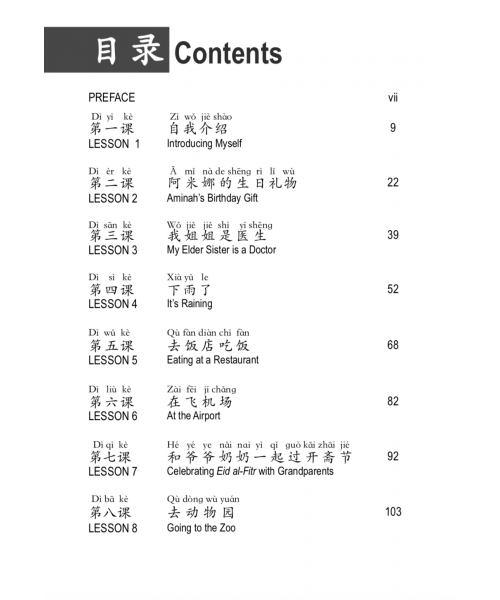Love, a profound emotion that transcends cultural boundaries, finds its heartfelt expression in every language. Mandarin, the native tongue of over a billion hearts, offers an array of beautiful ways to convey this powerful sentiment. Whether you wish to confess your affection to a cherished one or simply add warmth to your conversations, mastering these heartfelt expressions will unlock the doors to deeper connections and meaningful interactions. Embark on this linguistic journey with us, and let the sweet melodies of love resonate in your Mandarin vocabulary.

Image: mybookstore.usim.edu.my
Beyond Wo Ai Ni: Exploring the Nuances of Love Expression
“Wo ai ni,” the iconic phrase that has become synonymous with love in Mandarin, captures the essence of romantic affection and deep attachment. However, the Chinese language, in its richness and complexity, offers an array of other expressions that delve into the varying shades and depths of love. These expressions, each carrying its unique nuance, provide ample opportunities to express your sentiments with precision and sincerity.
Navigating the Cultural Context: Who Can Say Wo Ai Ni?
In Mandarin-speaking cultures, the expression “wo ai ni” is typically reserved for intimate relationships, conveying a level of deep affection and commitment. While it can be used among family members, it is more commonly employed between romantic partners. It is important to note that using “wo ai ni” in a casual or non-romantic context may lead to misinterpretation or discomfort. For a broader range of scenarios, an array of alternative expressions can convey affection and love in a more subtle yet heartfelt manner.
Exploring the Landscape of Love Expressions: A Lexicon of Affection
“Xihuan” is an expression that aptly captures the sentiments of liking or having a fondness for someone or something. It falls short of the romantic intensity of “wo ai ni,” rendering it suitable for expressing general affection, admiration, or platonic love. When accompanied by the object of your affection, “xihuan ni” conveys a clear message of your admiration and regard.
“Qing’ai” and its diminutive form, “aiai,” carry the connotation of endearment and intimacy, often used between close friends, family members, or romantic partners. These expressions exude a sense of warmth and closeness, adding a touch of affection to everyday conversations.
“Ganqing” encompasses a broad spectrum of emotions, including love, affection, and appreciation. It delves into the realm of deeper emotional connections, forging a bond of understanding and shared experiences. “Ganqing hen shen” translates to “deep affection,” expressing a profound attachment and enduring emotional connection.

Image: learnlanguagesfromhome.com
Situational Nuances: Love in Conversation and Personal Correspondence
In everyday conversations, “xihuan” serves as a versatile expression for conveying appreciation and affinity. Whether expressing your fondness for a colleague’s new dress or delighting in a friend’s recent accomplishments, “xihuan” effectively communicates your positive sentiments.
When writing a personal letter or sending a heartfelt message, “qing’ai de” can infuse warmth and affection into your words. This expression, often coupled with the recipient’s name, sets a tone of endearment and familiarity. For example, “qing’ai de Xiao Li” translates to “Dear Xiao Li,” adding a touch of intimacy to your written communication.
Beyond Words: Love’s Expression in Non-Verbal Cues
In the delicate dance of human connection, love finds expression not only through spoken words but also through a symphony of non-verbal cues. Eye contact, a potent form of communication, conveys volumes about our sentiments. Maintaining steady and meaningful eye contact signifies genuine interest, engagement, and an unspoken connection.
Facial expressions, too, play a pivotal role in transmitting the language of love. A gentle smile, a radiant glow, or a tender gaze can convey a wealth of emotions, from adoration to affection. Non-verbal cues, when synchronized with spoken words, amplify their impact, adding depth and sincerity to the message of love.
Love in Action: Embracing Romantic Gestures
In the realm of love, actions often speak louder than words. Thoughtful gestures, such as giving gifts, writing love letters, or planning special surprises, can profoundly express your affection and commitment. These tangible expressions of love create lasting memories, nurturing the bond you share.
In Mandarin-speaking cultures, the concept of “mianzi,” or “face,” holds great significance. Public displays of affection, while not as common as in some Western cultures, can be meaningful gestures of love. Holding hands, sharing a gentle kiss, or giving a warm embrace can convey a depth of emotion that words alone cannot fully capture.
How To Say Love In Mandarin
https://youtube.com/watch?v=sMAafVP-W_g
The Power of Love: Its Impact on Relationships and Well-being
Love, in all its forms, plays a pivotal role in our lives. It fosters strong, lasting relationships, providing a bedrock of emotional support, companionship, and shared experiences. Love nurtures our well-being, reducing stress, enhancing resilience, and promoting overall happiness.
When love is present in our lives, it empowers us to overcome challenges, pursue our dreams, and live more fulfilling and meaningful lives. Its presence enriches our interactions, adding depth, purpose, and enduring joy to the human experience